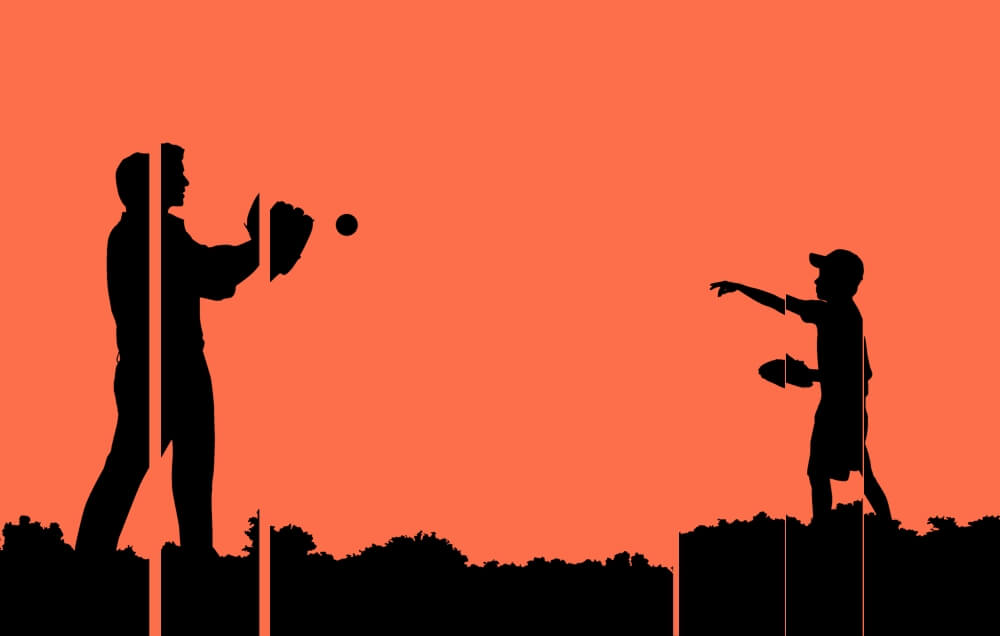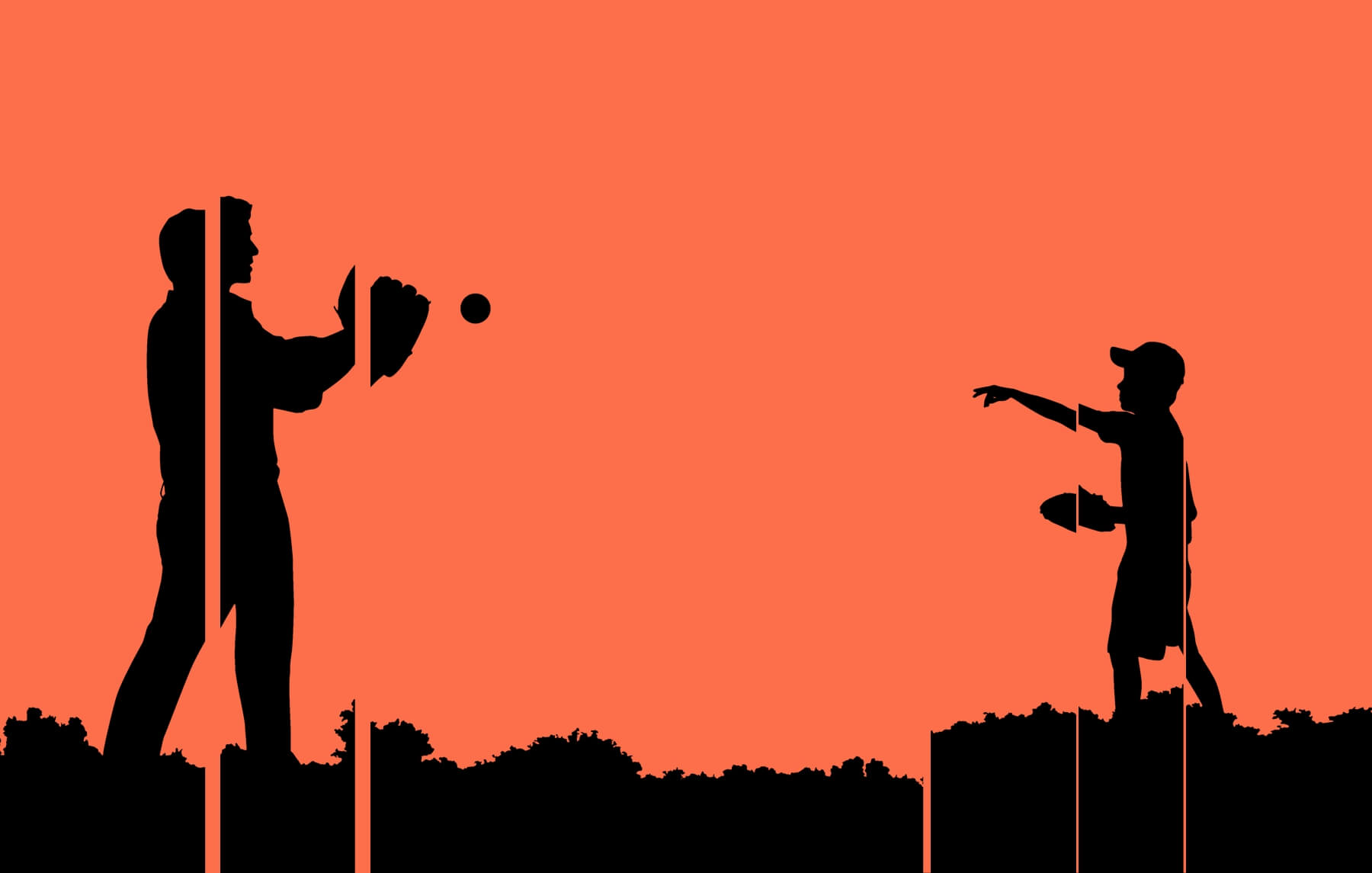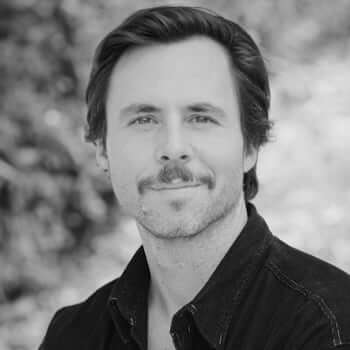“
Call it burnout or an existential crisis—modern men hit a psychic rock bottom eventually.”
Our resident life coach is here to sort things out


Our resident life coach tackles
a man’s most complicated relationship

My pal David Sutcliffe leads workshops in a program called Core Energetics. “Core” is no picnic: it's intensive psychodrama therapy where a circle of folks gather together to support each other as they recreate and relive their childhood trauma. David, who has facilitated hundreds of these workshops, maintains that nine out of ten processes end in the exact same scene: The adult man who has volunteered to be the protagonist in a fully regressed, childlike state, crying out for his father.
I'm telling you about this because it's so visual, and says so much about the state of our father-deprived culture. Nowhere is a father figure craved more than amongst men and boys. When I wrote my first Inside Man column a month ago, I received at least a dozen emails from guys of all ages that read: “Please write something about losing/never having/or never feeling close to your father.” It's a story so many men can relate to, and one I know well.
When I was four, my parents got divorced and my father moved out of the house. I remember the day he left. I sat with my mother on the porch wondering if I'd ever see him again. (That's how four-year-olds think, in absolutes.)
“
Call it burnout or an existential crisis—modern men hit a psychic rock bottom eventually.”
Dad didn't disappear. But no matter how many of my baseball teams he coached, how many times I rode shotgun in his truck, or how many beers we toasted once I was legal, I will never forgot that scene of him leaving. It left behind a wound: a wound that would continue to expand after his suicide eighteen years later, a wound that nearly swallowed me.
Minnesota poet and Mythopoetic Men's Movement founder Robert Bly wrote at length about the deep father wound that men in the modern world receive in his book Iron John—a book I recommend to all my clients. In it, Bly lays out an archetypal journey each man can undergo to heal their father wound and reclaim themselves. My experience coaching and counseling men has revealed a similar process, which I'll summarize here in seven steps:
In most American households, our fathers were either missing altogether—Denzel Washington recently called fatherlessness the number one killer of Black men—or so busy and anxious from work and life stresses they were essentially numb. In other cases, our Dads were actually comatose: self medicating with booze or drugs, or stuck in apathy, depression or denial. However it manifests, the emotional absence of the average Dad destroys a boy's chance of bonding with him. Children need reflection or “mirroring” from their primary caregivers—the affirmation that what they are feeling and experiencing is natural and human. And because most fathers are not fluent in or comfortable with the full spectrum of their own emotions (like their fathers before them) they can't always reflect these emotions back accurately to their boys.
A boy who receives little or no healthy mirroring from his father inherits a condition therapist and author John Bradshaw calls toxic shame. If the boy's father—the man he admires more than anyone—cannot reflect back what he is experiencing internally, he feels abandoned. In his confusion, the boy could come to believe he's inherently bad, flawed and unworthy of connection. Because of this rupture, the boy grows to mistrust the masculine energy in himself, and subsequently in other men. If he is hurt or vulnerable, he goes to women. But since he can't see himself in them, he often remains lost.
Most of our boys go to school lost, insecure, and searching for the identity and guidance they never received at home. When they eventually find it (on sports teams, in gangs or fraternities, churches or bands, or at the skate park) they're susceptible to the collective values that are held highest in those circles. From these values, they create a false masculine identity—a persona that gets them approval from their crew of choice, but ultimately betrays their true self, which is still hurting, still needy, still longing for fatherly approval. He continues to bottle up his real emotions, and trudges on.
Young men take this false persona out into the world. Only through achievement, and only conditionally, can they be redeemed. That's the American way, right? And, of course, this relief is only temporary: You're only as good as your last success. During this time, the young man is always trying to fit in, measure up and never sure how to handle life's stresses. He's confused by relationships, knocked off center by the smallest setback: traffic, a slow subway train, a business deal that falls through, a broken heart. Along the way, he's skeptical of guidance from older men, including his father. He doesn't understand me, anyway. Never has.
After going along living a lie for some time, the fall is inevitable. It used to take the form of a midlife crisis, but I see it happening now with my clients as early as their mid-twenties. Call it burnout or an existential crisis—modern men hit a psychic rock bottom eventually. Falls vary in duration and intensity, but if we're lucky, the fall signals a time to seek help. As a coach, this is the stage when I encounter my clients for the first time.
We reach out to a friend, a therapist or a mentor. We enter rehab, or find a men's group. It is here, in this safe space, that we can finally unmask ourselves, and express the pain and frustration we've been bottling up. The nods and smiles and loving humor of our peers and older men alike act as a sort of “Second Father” and through this healthy mirroring, we heal enough of that early dad wound to facilitate the return to our own father. This doesn't have to be a literal return (for many of us this stage in the cycle happens after our father is long dead), but we must come to understand and relate with the man who is one half of our DNA, as a way of making sense of who we are.
Approaching our father after so many years of never engaging on more than a surface level is intimidating. Maybe initiating a deeper connection feels awkward. Maybe we've drifted out of touch completely and fear the return to regular contact. Maybe we hate him. Whatever the scenario, we can take it slow. A simple letter or invitation to chat will go a long way. Sometimes, for whatever reason, contact with our father is either unsafe or not possible. There are options here, too. Many of the guys in our Thursday Men's group write letters to their Dads that they then burn or shred without sending. This is a powerful exercise. The point is to express what couldn't be expressed in childhood, to own the full spectrum of our experience.
Advertisement
My own return to my father began a decade after his death. Over the course of several years, I made many trips back to my hometown in Maine where I interviewed his friends, his colleagues, his former lovers, his college roommates—anyone who could help me fill out the picture of who he was. I wore his watch, listened to his music, read his letters and sifted through boxes of old photos I'd found in his basement. Because of all the therapy I'd been through, it was easy to spot my father's toxic shame: it came as the result of growing up an orphan, raised by an alcoholic father, and thrust into an upper crust world he didn't understand. I saw his wound, and the way he tried to overcompensate for it. I knew all his desires and insecurities because they had been my own. Ultimately, I forgave him in his humanness, as I'd been learning to forgive myself. I felt closer to him than I ever had. I saw him fully, and came to love him massively. I accepted the wound as a part of who I am, and became ready to let my father go.
As Bly writes, this process of acknowledging our father wounds is synonymous with manhood, and with becoming an adult. While our individual wound festers, we remain man-children, Puer aeternus—Peter Pan-like dudes who continue to let our unfelt rage and grief run our lives. This makes healthy relationships with partners and children nearly impossible. And keeps us locked in either enmeshed, childlike dependence or estrangement with our parents. It's in this state that we lack balance and temperance, and we see the disastrous affects of this everywhere in our culture: bullying politicians, abusive bosses, highly-talented (but ultimately boyish and destructive) sports heroes and musicians. Why can't they get it together and be leaders? We live in a society of boys gone wild. And behind every boy gone wild is a father wound that runs deep.
The process above is a beginning. If we do the work of owning and healing our collective Dad wounds, we can be the first generation of men to change a long-held paradigm, and usher in a mindful era of masculinity. We can shift from fractured and toxic to something whole. And it is only in wholeness that we have the chance to be the fathers, sons and partners our predecessors could not be. Not because they didn't want to, but because they didn't have the education or the tools. That, in these times, is no longer an excuse.
You’ve now got a life coach at your disposal. Hit Sean up with any concern you’re currently struggling with: Trouble at work? Relationship worries, family struggles or general mental health concern? Let him help you tackle it each month in this column.
Advertisement
